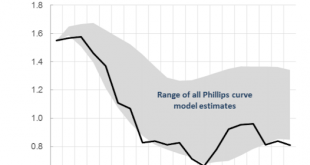Thoughtful reflection on historical precedent. These observations are particularly useful because they point to an intellectually rigorous way in which debates over the wisdom of the Green New Deal and the usefulness of MMT might be resolved: by examining more carefully the political and economic history of the 1970s. Was the high inflation of that decade a consequence of excessive money growth, engineered by the Fed to relieve budgetary pressures—the source of the “anguish” in Burns’...
Read More »Brendan Greeley — When DoJ and the FCC slowed inflation
Two weeks ago Alphaville published a clarification on modern monetary theory by Scott Fullwiler, Rohan Grey and Nathan Tankus. They argued that, counter to what had been reported, MMT does not rely exclusively on raising taxes to counter inflation. Proper MMT, they wrote, uses a lot of tools to manage inflation -- taxes only one among them.... FT Alphaville (Free registration required if not a FT subscriber) When DoJ and the FCC slowed inflation Brendan Greeley
Read More »Why Central Bankers Don’t Understand Inflation
My debut post at CapX develops a theme I have written about many times. Central bankers are tasked with controlling inflation, but they don't understand it. For the last decade, central banks in developed countries have been pursuing policies designed to raise inflation. Quantitative easing, cheap funding for banks, tinkering with yield curves, low and negative interest rates – all aim to raise inflation to the ubiquitous 2% target. Understandably, central banks’ inflation forecasts...
Read More »Inflation Is Always And Everywhere A Political Phenomenon
We don't understand inflation. Those who lived through the high inflation of the 1970s are convinced that inflation is always and everywhere caused by wage-price spirals. Germans, economic Austrians and Bitcoiners are convinced that inflation is always and everywhere caused by central bank money printing. Small-state supporters are convinced that inflation is always and everywhere caused by profligate governments borrowing and spending excessively. Hard money enthusiasts are convinced that...
Read More »Galbraith on MMT and the Hyperinflation Boogeyman
From his recent piece: "Does this mean that 'deficits don’t matter'? I know of no MMT adherent who has made such a claim. MMT acknowledges that policy can be too expansionary and push past resource constraints, causing inflation and exchange-rate depreciation – which may or may not be desirable. (Hyperinflation, on the other hand, is a bogeyman, which some MMT critics deploy as a scare tactic.)"Also, this: "And MMT is not about Congress ordering the Fed to use its “balance sheet as a cash...
Read More »John T. Harvey — Inflation…Huh…What Is It Good For?
Unfortunately, there are a great many misconceptions out there about inflation. Since I can't possibly address them all in a short blog post, I figured I'd take on just one: the idea that it is a net loss for everyone. The reason people believe this is partly because of the manner in which most economists teach the concept and also because we naturally transfer how a phenomenon affects us individually to the macro level. If inflation reduces my standard of living, then it must be doing the...
Read More »Bill Mitchell — Operationalising core MMT principles – Part 2
This is the second and final part of this cameo set, which aims to clear up a few major blind spots in peoples’ embrace with Modern Monetary Theory (MMT). This is all repetition. I don’t apologise for that and it does not reflect a slack or bad editorial approach from yours truly as some critics have claimed. Repetition is how we learn. Reinforcing things in different ways (aka repetition) helps people come to terms with concepts and ideas that give them dissonance. MMT is certainly about...
Read More »ECB forecasting is a joke
Over at Bruegel, Zsolt Darvas takes the ECB to task for systematic forecasting errors in the last five years. He shows that the ECB has persistently overestimated inflation and unemployment, and on this basis he questions the ECB's decision to end QE in December 2018. I share his concern that the ECB has tightened too soon, though as the ECB's QE program is seriously flawed and very damaging, I am not sorry to see the back of it.But I think that in focusing on the last five years, he has...
Read More »Tcherneva, Sawicky and Kaboub on MMT and policy
Pavlina Tcherneva: There is nothing more crippling to a bold policy agenda than the myth that the government can run out of money. This myth is behind every But how will you pay for it? objection to proposals such as a Green New Deal and Medicare for All. New House Majority Leader Nancy Pelosi (D-Calif.) has even proposed instituting self-defeating PAYGO (pay as you go) rules, which would require all new government spending to be matched with increased revenue, wrongly prioritizing the...
Read More »Reuters — Fed plans major review of how it pursues inflation, employment goals
The Federal Reserve will conduct an extensive review next year of how it tries to guide the U.S. economy, the U.S. central bank said on Thursday. “Now is a good time to take stock of how we formulate, conduct, and communicate monetary policy,” said Federal Reserve Chairman Jerome Powell, noting that the Fed was close to meeting its goals of maximum employment and a 2 percent inflation rate. In a statement, the Fed said it would reach out to a “broad range” of stakeholders and that it...
Read More » Heterodox
Heterodox




